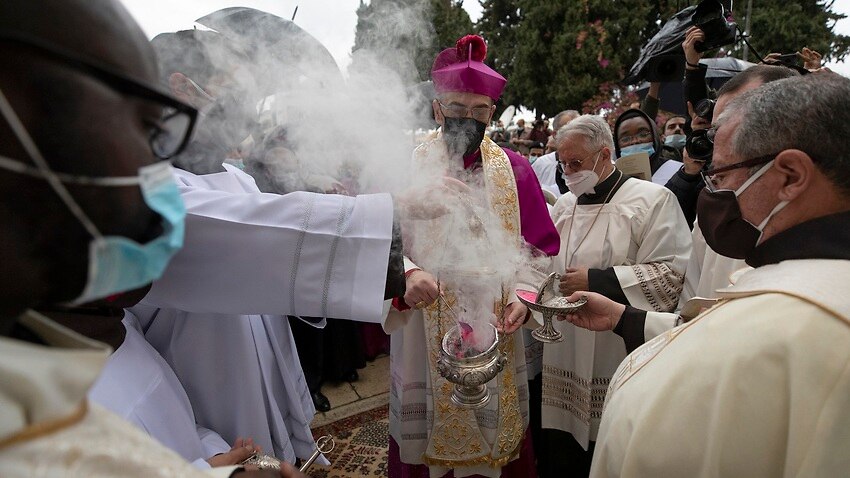Christmas festivities began on Friday, with hundreds of millions across the world under coronavirus restrictions celebrating a pared-down version of a holiday typically marked by travel and large gatherings.
The battle to halt the pandemic, which has claimed more than 1.7 million lives, is far from over despite the launching of mass vaccine campaigns that offer the promise of an eventual return to normalcy.
Churches across South Korea stood largely empty, with worshippers congregating online as the country reported a new daily caseload record.
“It really is heartbreaking to see,” said Park Jae-woo, a member of the Yoido Full Gospel Church in Seoul which would usually expect up to 10,000 worshippers, but on Friday was only able to welcome 15 staff and choir members.
And in Catholic-majority Philippines, services were rocked when a 6.3-magnitude earthquake struck the country, capping off a troubled yuletide already muted by bans on parties and carol singing.
“Sad, very sad. Seeing everyone in masks, even the priest and altar servers, reminded me that the world as I know it is not the same,” Manila resident Kyen Quimpo Mallonga said after after watching Christmas Eve mass on television instead of attending her local church for fear of catching the virus.
“It’s Christmas time and people are supposed to be shaking hands, kissing or hugging,” she said after missing Christmas midnight mass for the first time in her life.
Pope Francis, spiritual leader of the world’s 1.3 billion Catholics, celebrated Christmas Eve mass in St Peter’s Basilica before fewer than 200 masked faithful, mostly employees of the tiny Vatican state.
The mass, traditionally held at midnight, had been moved forward to meet Italy’s curfew rules.
Before the pandemic hit, several thousand believers and tourists had obtained precious tickets to attend the papal mass.
St Peter’s Square, usually thronged with people on Christmas Eve, was deserted on Thursday evening, illuminated by the glow of its towering Christmas tree and the lights of a police car.
Tough new coronavirus restrictions were imposed on Thursday over the Christmas and New Year period across Italy, the country hardest hit by the virus in Europe, with nearly 71,000 deaths and more than two million cases since the beginning of the pandemic.
The Christmas Eve mass commemorates the birth of Jesus of Nazareth in Bethlehem.
In his homily, the Argentine pope stressed that the birth of a child reminds us not to spend our days “lamenting our lots, but soothing the tears of those who suffer”, serving “the poor”.
Pope Francis, who just celebrated his 84th birthday, will give his eighth Christmas message “Urbi et orbi” (“to the city and the world”) on Friday by video from the apostolic palace, to prevent a crowd from gathering in St Peter’s Square.
Thin crowds in Bethlehem
Bethlehem, where Christians believe Jesus was born, was preparing for a Christmas unlike any in its recent history.
Christmas Eve mass at the Church of the Nativity is traditionally the highlight of a holiday season that sees hundreds of thousands of visitors flock to the Palestinian city in the occupied West Bank.
The service was held online this year, with only clergy and select individuals allowed inside the basilica, which was sterilised ahead of the service.
“Everyone feels darkened, tired, exhausted, oppressed for too long under the heavy burden of this pandemic that besieges our lives,” said the Latin Patriarch of Jerusalem, Pierbattista Pizzaballa.
In war-ravaged northeast Syria, hundreds of residents of a predominantly Christian neighbourhood in the town of Qamishli ditched face masks and donned Santa hats, throwing caution to the wind to celebrate a Christmas tree lighting ceremony.
“We were concerned celebrations would be cancelled this year due to the novel coronavirus, but as you can see everyone is here celebrating and we are happy,” said Maria Danhou, a 36-year-old mother of two.
Holiday isolation
Germany has been forced to cancel its famous Christmas markets, while in Kuwait, churches were closed until 10 January despite being home to a large Christian community.
For many, the isolation that has defined the past year will continue into Christmas Day and beyond, such as in Belgium, where residents are largely limited to welcoming a single visitor.
Britons, meanwhile, were cut off from swathes of the world due to the emergence of a new COVID-19 strain.
Some UK border restrictions have been temporarily relaxed for the holidays, but thousands from other European countries are still stranded in England.
“Home for Christmas? Forget it,” said Laurent Beghin, a French truck driver who delivered his cargo but was still stuck days later.
People in Australia must stay at least 1.5 metres away from others. Check your jurisdiction’s restrictions on gathering limits.
If you are experiencing cold or flu symptoms, stay home and arrange a test by calling your doctor or contact the Coronavirus Health Information Hotline on 1800 020 080.
News and information is available in 63 languages at sbs.com.au/coronavirus.
Please check the relevant guidelines for your state or territory: NSW, Victoria, Queensland, Western Australia, South Australia, Northern Territory, ACT, Tasmania.









